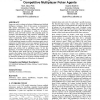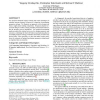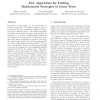156 search results - page 25 / 32 » Homotopy Methods to Compute Equilibria in Game Theory |
ATAL
2008
Springer
13 years 9 months ago
2008
Springer
Coalitional games raise a number of important questions from the point of view of computer science, key among them being how to represent such games compactly, and how to efficien...
ATAL
2010
Springer
13 years 8 months ago
2010
Springer
Games are used to evaluate and advance Multiagent and Artificial Intelligence techniques. Most of these games are deterministic with perfect information (e.g. Chess and Checkers)....
ATAL
2010
Springer
13 years 8 months ago
2010
Springer
Multi-agent learning is a crucial method to control or find solutions for systems, in which more than one entity needs to be adaptive. In today's interconnected world, such s...
SIGECOM
2006
ACM
14 years 1 months ago
2006
ACM
Our proposed methods employ learning and search techniques to estimate outcome features of interest as a function of mechanism parameter settings. We illustrate our approach with ...
STOC
1994
ACM
13 years 11 months ago
1994
ACM
Interactions among agents can be conveniently described by game trees. In order to analyze a game, it is important to derive optimal (or equilibrium) strategies for the di erent p...



